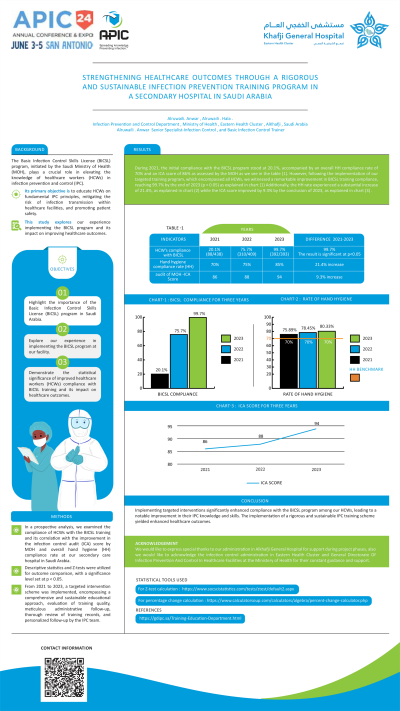Education, Training and Competencies
Category: Education, Training and Competencies
Poster Theater Session V
ETC 53 - Strengthening Healthcare Outcomes Through a Rigorous and Sustainable Infection Prevention Training Program in a Tertiary Care Hospital in Saudi
Tuesday, June 4, 2024
12:44 PM - 12:48 PM CST
Location: Digital Poster Theater - APIC Central, Hall 1

Has Audio
.jpg)
anwar alruwaili
INFECTION CONTROL COORDINATOR
KSA.MOH- HA
Hala Alruwaili
Infection Control Director
KSA, MOH , EHC
Presenter(s)
Co-Author(s)
Disclosure(s):
anwar alruwaili: No financial relationships to disclose
Hala Alruwaili: No financial relationships to disclose
Background: The Basic Infection Control Skills License (BICSL) program, initiated by the Saudi Ministry of Health (MOH), plays a crucial role in elevating the knowledge of healthcare workers (HCWs) in infection prevention and control (IPC). Its primary objective is to educate HCWs on fundamental IPC principles, mitigating the risk of infection transmission within healthcare facilities, and promoting patient safety. This study explores our experience implementing the BICSL program and its impact on improving healthcare outcomes.
Methods: In a prospective analysis, we examined the compliance of HCWs with the BICSL training and its correlation with the improvement in the infection control audit (ICA) score by MOH and overall hand hygiene (HH) compliance rate at our tertiary care hospital in Saudi Arabia. Descriptive statistics and Z-tests were utilized for outcome comparison, with a significance level set at p < 0.05. From 2021 to 2023, a targeted intervention scheme was implemented, encompassing a comprehensive and sustainable educational approach, evaluation of training quality, meticulous administrative follow-up, thorough review of training records, and personalized follow-up by the IPC team.
Results: During 2021, the initial compliance with the BICSL program stood at 20.1%, accompanied by an overall HH compliance rate of 70% and an ICA score of 86% as assessed by the MOH. However, following the implementation of our targeted training program, which encompassed all HCWs, we witnessed a remarkable improvement in BICSL training compliance, reaching 99.7% by the end of 2023 (p < 0.05). Additionally, the HH rate experienced a substantial increase of 21.4%, while the ICA score improved by 9.3% by the conclusion of 2023.
Conclusions: Implementing targeted interventions significantly enhanced compliance with the BICSL program among our HCWs, leading to a notable improvement in their IPC knowledge and skills. The implementation of a rigorous and sustainable IPC training scheme yielded enhanced healthcare outcomes.
Learning Objectives:
- Highlight the importance of the Basic Infection Control Skills License (BICSL) program in Saudi Arabia.
- Explore our experience in implementing the BICSL program at our facility.
- Demonstrate the statistical significance of improved healthcare workers' (HCWs) compliance with BICSL training and its impact on healthcare outcomes.

